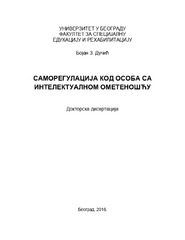Приказ основних података о документу
Self-regulation in persons with intellectual disability
Samoregulacija kod osoba sa intelektualnom ometenošću
| dc.contributor.advisor | Gligorović, Milica | |
| dc.contributor.other | Kaljača, Svetlana | |
| dc.contributor.other | Đurić-Zdravković, Aleksandra | |
| dc.contributor.other | Golubović, Špela | |
| dc.creator | Dučić, Bojan | |
| dc.date.accessioned | 2021-06-09T13:07:57Z | |
| dc.date.available | 2021-06-09T13:07:57Z | |
| dc.date.issued | 2017 | |
| dc.identifier.uri | http://eteze.bg.ac.rs/application/showtheses?thesesId=5774 | |
| dc.identifier.uri | http://nardus.mpn.gov.rs/handle/123456789/9458 | |
| dc.identifier.uri | https://fedorabg.bg.ac.rs/fedora/get/o:17637/bdef:Content/download | |
| dc.identifier.uri | http://vbs.rs/scripts/cobiss?command=DISPLAY&base=70036&RID=50056719 | |
| dc.identifier.uri | http://rfasper.fasper.bg.ac.rs/handle/123456789/19 | |
| dc.description.abstract | Self-regulation is defined as an ability to suppress distracters and to direct personal cognitive, emotional, and behavioral capacities towards achieving a previously set goal. The interest in the concept of self-regulation increased in the 1960s, when it was determined that the strategies applied in organizing personal potentials were significantly related with achievements in different life areas, including the success in developing social relationships. The following three objectives were formulated in this research: (1) to determine the acquisition level of social skills, attention, executive functions, and self-regulation in typically developing persons (TD) and persons with intellectual disability (ID), (2) to determine the relation of attention capacities and basic components of executive functions with the acquisition level of self-regulation skills in TD persons and persons with ID, (3) and to determine the relation of attention, basic components of executive functions, and self-regulation with the acquisition level of social adaptive skills... | en |
| dc.description.abstract | Samoregulacija se određuje kao sposobnost supresije delovanja distraktora i usmeravanja sopstvenih kognitivnih, emocionalnih i bihevioralnih kapaciteta ka ostvarivanju unapred definisanog cilja. Tokom šezdesetih godina prošlog veka javlja se povećano interesovanje za koncept samoregulacije, jer je utvrđeno da su strategije koje se primenjuju pri organizovanju sopstvenih potencijala značajno povezane sa postignućem u različitim životnim oblastima, između ostalog, i sa uspehom u ostvarivanju socijalnih odnosa. U ovom radu formulisana su tri cilja: (1) utvrditi nivo usvojenosti socijalnih veština, pažnje, egzekutivnih funkcija i samoregulacije kod osoba tipičnog razvoja (TR) i osoba sa intelektualnom ometenošću (IO), (2) utvrditi povezanost kapaciteta pažnje i bazičnih komponenata egzekutivnih funkcija sa nivoom usvojenosti veština samoregulacije kod osoba TR i osoba sa IO, (3) utvrditi povezanost pažnje, bazičnih komponenata egzekutivnih funkcija i samoregulacije sa nivoom razvijenosti socijalnih adaptivnih veština... | sr |
| dc.language | sr | |
| dc.publisher | Univerzitet u Beogradu, Fakultet za specijalnu edukaciju i rehabilitaciju | |
| dc.relation | info:eu-repo/grantAgreement/MESTD/Basic Research (BR or ON)/179025/RS// | |
| dc.rights | openAccess | |
| dc.source | Univerzitet u Beogradu | |
| dc.subject | self-regulation | en |
| dc.subject | intellectual disability | en |
| dc.subject | social skills | en |
| dc.subject | working memory | en |
| dc.subject | self-control | en |
| dc.subject | samoregulacija | sr |
| dc.subject | intelektualna ometenost | sr |
| dc.subject | socijalne veštine | sr |
| dc.subject | radna memorija | sr |
| dc.subject | samokontrola | sr |
| dc.title | Self-regulation in persons with intellectual disability | en |
| dc.title | Samoregulacija kod osoba sa intelektualnom ometenošću | sr |
| dc.type | doctoralThesis | |
| dc.identifier.fulltext | http://rfasper.fasper.bg.ac.rs/bitstream/id/314/16.pdf | |
| dc.identifier.rcub | https://hdl.handle.net/21.15107/rcub_nardus_9458 | |
| dc.type.version | publishedVersion |


